Garden Maintenance in Thornton Heath
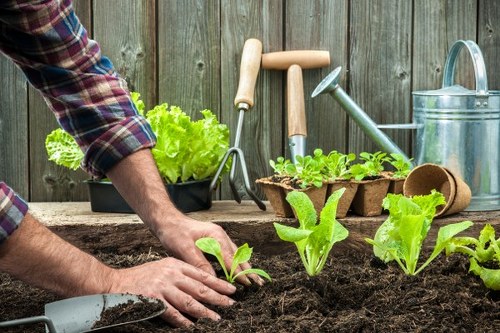
Maintaining a vibrant and healthy garden in Thornton Heath requires dedication, knowledge, and the right strategies. Whether you're a seasoned gardener or just starting, understanding the specific needs of your garden can make all the difference in ensuring its longevity and beauty.
**Garden maintenance** involves a variety of tasks, from regular watering and pruning to more specialized activities like soil testing and pest control. By implementing a comprehensive maintenance plan, you can enjoy a thriving garden that enhances the beauty of your home and provides a peaceful retreat.
In Thornton Heath, the local climate and soil conditions play a significant role in determining the best practices for garden care. This article explores essential garden maintenance tips, services, and seasonal tasks tailored specifically for residents of Thornton Heath.

The Importance of Regular Garden Maintenance
Regular garden maintenance is crucial for several reasons:
- Health of Plants: Consistent care ensures that plants receive the necessary nutrients and are free from pests and diseases.
- Enhanced Aesthetics: A well-maintained garden adds visual appeal to your property, making it more inviting.
- Property Value: Landscaped gardens can increase the value of your home, providing a good return on investment.
- Environmental Benefits: Gardens contribute to better air quality, provide habitats for beneficial insects, and help manage rainwater runoff.
By prioritizing garden maintenance, homeowners in Thornton Heath can enjoy these benefits year-round.
Implementing a maintenance schedule tailored to the specific needs of your garden can streamline these tasks, making them more manageable and effective.
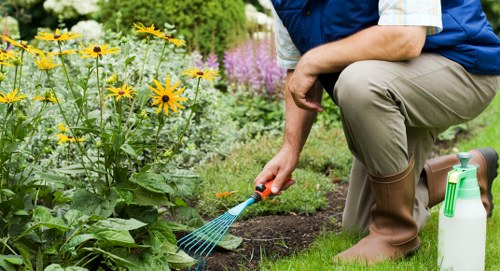
Seasonal Garden Maintenance Tasks
Spring Maintenance
Spring is a crucial time for garden maintenance in Thornton Heath. As the weather warms up, plants begin to grow rapidly, and it's essential to prepare your garden for the growing season.
- Pruning: Remove dead or damaged branches to encourage healthy growth.
- Soil Preparation: Test and amend the soil to ensure it has the necessary nutrients.
- Planting: Introduce new plants and flowers to add variety and color to your garden.
- Weeding: Keep garden beds free from weeds that compete with your plants for resources.
By addressing these tasks in the spring, you set a strong foundation for a flourishing garden throughout the year.
Summer Maintenance
Summer in Thornton Heath brings intense sunlight and warmer temperatures, which require specific maintenance practices to keep your garden thriving.
- Watering: Ensure consistent watering, especially during dry spells, to prevent plant stress.
- Pest Control: Monitor for common pests and treat infestations promptly to protect your plants.
- Mulching: Apply mulch to retain soil moisture and suppress weed growth.
- Deadheading: Remove spent flowers to encourage continuous blooming.
Proper summer maintenance helps plants withstand heat and continue producing vibrant blooms.

Essential Garden Maintenance Services
Lawn Care
A lush, green lawn is the centerpiece of any garden. Professional lawn care services in Thornton Heath offer:
- Regular Mowing: Keeping the grass at an optimal height promotes healthy growth.
- Fertilization: Providing essential nutrients to maintain turf vitality.
- Aeration: Improving soil oxygen levels and water penetration.
- Weed Control: Eliminating unwanted weeds that disrupt the lawn's uniformity.
Pruning and Trimming
Pruning is vital for maintaining the shape and health of plants. Services include:
- Structural Pruning: Shaping trees and shrubs to enhance their structure.
- Maintenance Pruning: Removing overgrown or diseased branches.
- Flower and Fruit Pruning: Encouraging better blooms and fruit production.
Expert pruning ensures that your garden remains tidy and that plants grow optimally.
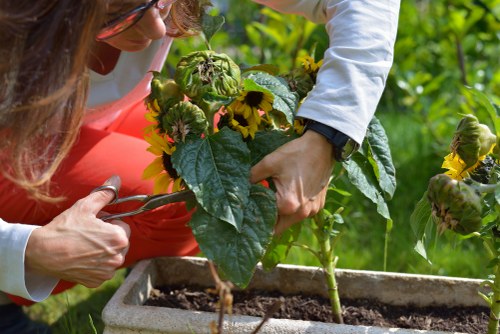
Choosing the Right Plants for Thornton Heath Gardens
Selecting plants that thrive in Thornton Heath's climate is essential for successful garden maintenance. Consider the following factors when choosing plants:
- Climate Adaptability: Opt for plants that can withstand local weather conditions, including temperature fluctuations and rainfall patterns.
- Soil Type: Understand your soil's pH and texture to select compatible plant species.
- Sunlight Exposure: Choose plants based on the amount of sunlight different areas of your garden receive.
- Water Requirements: Balance plants with similar water needs to simplify irrigation.
Popular plant choices for Thornton Heath gardens include perennials like lavender and hostas, shrubs such as hydrangeas and boxwoods, and trees like magnolias and oak varieties.
Perennials and Annuals
Incorporating a mix of perennials and annuals can provide continuous color and interest throughout the seasons. Perennials offer longevity, returning year after year with minimal replanting, while annuals allow for seasonal variety and experimentation.
Recommended Perennials:
- Lavender: Fragrant and drought-tolerant, perfect for borders.
- Hostas: Shade-loving plants with attractive foliage.
- Daylilies: Hardy flowers that come in various colors.
Popular Annuals:
- Marigolds: Bright and easy to grow, ideal for adding pops of color.
- Zinnias: Vibrant flowers that attract pollinators.
- Petunias: Versatile and available in numerous shades.
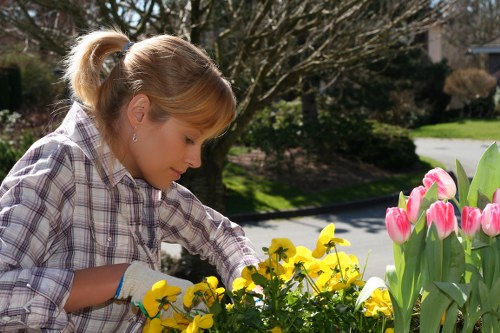
Soil Health and Fertilization
Healthy soil is the foundation of a thriving garden. Maintaining soil health involves:
- Soil Testing: Assessing soil pH and nutrient levels to determine necessary amendments.
- Composting: Adding organic matter to improve soil structure and fertility.
- Mulching: Retaining moisture, regulating soil temperature, and preventing erosion.
- Crop Rotation: Changing plant locations to avoid nutrient depletion and reduce pest buildup.
Regular fertilization provides essential nutrients that support plant growth and resilience against diseases.
Organic vs. Synthetic Fertilizers
Choosing between organic and synthetic fertilizers depends on your gardening philosophy and specific needs:
- Organic Fertilizers: Derived from natural sources like compost, manure, and bone meal. They improve soil structure and promote microbial activity.
- Synthetic Fertilizers: Manufactured chemically to provide targeted nutrients quickly. They are effective for immediate plant needs but may not enhance long-term soil health.
Integrating both types can offer a balanced approach to soil nourishment.
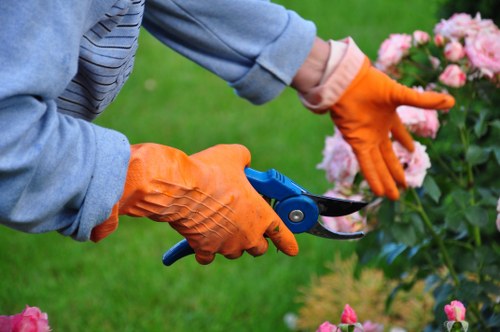
Pest and Disease Management
Protecting your garden from pests and diseases is a critical aspect of maintenance. Effective management strategies include:
- Regular Monitoring: Inspect plants frequently for signs of pests or disease.
- Integrated Pest Management (IPM): Combines biological, cultural, mechanical, and chemical methods to control pests sustainably.
- Proper Plant Selection: Choosing disease-resistant plant varieties reduces the likelihood of infestations.
- Healthy Practices: Maintaining optimal plant health makes them less susceptible to pests and diseases.
By addressing issues promptly and using eco-friendly solutions, you can maintain a healthy and thriving garden.
Common Garden Pests in Thornton Heath
Some common pests to watch out for include:
- Aphids: Small insects that suck plant sap, causing leaves to curl and yellow.
- Slugs and Snails: Mollusks that damage plants by eating leaves and stems.
- Japanese Beetles: Metallic-green beetles that feed on flowers and foliage.
Implementing natural pest controls, such as introducing beneficial insects like ladybugs, can help manage these pests effectively.
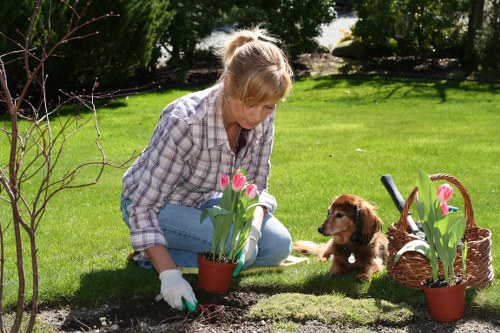
Irrigation and Water Management
Proper irrigation is essential for maintaining garden health, especially during dry periods in Thornton Heath. Effective water management involves:
- Efficient Watering Systems: Installing drip irrigation or soaker hoses to deliver water directly to plant roots.
- Scheduling: Watering early in the morning or late in the evening to minimize evaporation.
- Rainwater Harvesting: Collecting and using rainwater reduces dependence on municipal water supplies.
- Soil Moisture Monitoring: Using moisture sensors to determine when plants need watering.
Implementing these practices ensures that your garden receives the right amount of water, promoting healthy growth and conserving resources.
Benefits of Mulching
Mulching provides several advantages, including:
- Retaining soil moisture
- Suppressing weed growth
- Regulating soil temperature
- Improving soil structure as it decomposes
Organic mulches, such as bark, straw, and compost, are particularly beneficial for garden health.
Types of Mulch
- Organic Mulch: Includes materials like compost, wood chips, and shredded leaves.
- Inorganic Mulch: Comprises materials such as gravel, rubber, and plastic sheeting.
Choosing the right type of mulch depends on your garden's specific needs and aesthetic preferences.

Lawn Care Tips for Thornton Heath
A well-maintained lawn is a key feature of any garden. Here are essential lawn care tips tailored for Thornton Heath:
- Mowing: Keep your grass at the recommended height to promote deep root growth and prevent weeds.
- Fertilizing: Apply the right type of fertilizer based on your soil's nutrient needs.
- Watering: Water deeply and infrequently to encourage drought-resistant roots.
- Aeration: Aerate your lawn annually to reduce soil compaction and improve water infiltration.
- Overseeding: Introduce new grass seeds to fill in bare spots and enhance lawn density.
Choosing the Right Grass Type
Selecting a grass type suited to Thornton Heath's climate ensures a resilient and attractive lawn. Popular choices include:
- Fescue: Tolerates shade and remains green during cooler months.
- Ryegrass: Quick to establish and durable, ideal for high-traffic areas.
- Bermuda Grass: Warm-season grass that thrives in full sun and is highly drought-tolerant.
Consulting with local garden experts can help you choose the best grass type for your specific needs.

Professional Garden Maintenance Services
For those who prefer to leave garden maintenance to the experts, numerous professional services in Thornton Heath offer comprehensive care. These services typically include:
- Regular Maintenance Visits: Scheduled visits for tasks like mowing, pruning, and weeding.
- Seasonal Clean-Up: Preparing your garden for winter or rejuvenating it in spring.
- Landscape Design: Creating custom garden layouts that enhance your property's beauty.
- Pest and Disease Treatment: Managing infestations and preventing plant diseases.
- Irrigation System Installation: Setting up automated watering systems for efficient water usage.
Hiring professionals ensures that your garden receives expert care, saving you time and effort while achieving optimal results.
Benefits of Hiring Professionals
Engaging professional garden maintenance services offers several advantages:
- Expertise: Knowledgeable about the best practices and local conditions.
- Time-Saving: Frees up your schedule by handling time-consuming tasks.
- Consistent Results: Ensures your garden remains well-maintained throughout the year.
- Access to Tools: Professionals have the necessary equipment for efficient maintenance.
Choosing the Right Service Provider
- Experience: Look for services with a proven track record in Thornton Heath.
- Reputation: Check reviews and ask for references to gauge service quality.
- Services Offered: Ensure they provide the specific maintenance tasks you need.
- Pricing: Compare quotes to find a service that fits your budget.
Sustainable Garden Practices
Adopting sustainable practices in your garden not only benefits the environment but also enhances the health and resilience of your plants. Key sustainable practices include:
- Composting: Recycling garden waste and kitchen scraps to create rich compost for soil enrichment.
- Rainwater Harvesting: Collecting rainwater for irrigation reduces water consumption.
- Native Plants: Planting native species supports local biodiversity and requires less maintenance.
- Organic Gardening: Avoiding synthetic chemicals in favor of natural fertilizers and pest controls.
- Energy-Efficient Tools: Using manual or electric tools instead of gas-powered equipment minimizes pollution.
Implementing these practices creates a healthier garden ecosystem and promotes long-term sustainability.
Benefits of Native Plants
Native plants are well-adapted to the local climate and soil conditions, making them easier to maintain and more resistant to pests and diseases. They also provide habitat and food for native wildlife, contributing to a balanced ecosystem.
Examples of Native Plants in Thornton Heath
- Bluebells: Beautiful spring bloomers that attract pollinators.
- Foxgloves: Tall, elegant flowers that support bees and butterflies.
- Heather: Evergreen plants that offer year-round interest and support beneficial insects.
Integrating Native Plants
Incorporate native plants into your garden design by creating dedicated sections or blending them with ornamental species. This approach enhances biodiversity and ensures your garden remains resilient against environmental stresses.
Creating a Garden Maintenance Schedule
Organizing your garden maintenance tasks with a schedule ensures that nothing is overlooked and that your garden receives consistent care. Here's how to create an effective maintenance schedule:
- Assess Your Garden: Identify the specific needs of different areas, including lawns, flower beds, shrubs, and trees.
- List Maintenance Tasks: Enumerate tasks such as mowing, watering, pruning, fertilizing, and pest control.
- Determine Frequency: Assign each task to a specific time frame, whether daily, weekly, monthly, or seasonally.
- Use Tools: Utilize calendars, apps, or planners to track and remind you of upcoming tasks.
- Adjust as Needed: Be flexible and adjust the schedule based on seasonal changes and garden feedback.
Having a structured schedule helps maintain consistency and ensures that your garden remains in optimal condition.
Sample Monthly Maintenance Checklist
- January: Protect plants from frost, plan garden layout.
- February: Start seed sowing indoors, prune dormant trees.
- March: Clean garden tools, prepare soil for planting.
- April: Begin planting, apply mulch, start regular watering.
- May: Fertilize plants, monitor for pests.
- June: Maintain irrigation systems, prune summer growth.
- July: Deadhead flowers, manage weeds.
- August: Continue watering, prepare for fall planting.
- September: Plant spring bulbs, aerate lawns.
- October: Clean up fallen leaves, protect perennials.
- November: Mulch garden beds, prune for winter.
- December: Review garden performance, plan for the next year.
Benefits of a Maintenance Schedule
- Ensures timely care of all garden areas
- Prevents plant diseases and pest infestations
- Enhances overall garden health and appearance
- Reduces last-minute scrambling and stress
Conclusion
Maintaining a beautiful and healthy garden in Thornton Heath is achievable with the right knowledge and practices. By following seasonal maintenance tasks, choosing appropriate plants, managing soil health, and considering professional services, you can create a garden that not only looks stunning but also supports local biodiversity and provides a serene environment.
Adopting sustainable gardening practices further enhances the resilience and longevity of your garden, ensuring it remains a source of pride and relaxation for years to come.
**Ready to transform your garden?** Contact us today to book your garden maintenance service and take the first step towards a thriving, beautiful outdoor space.
